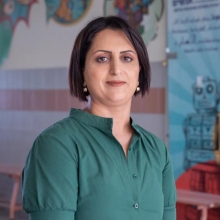Doctoral dynamos
The Ariane de Rothschild Program advances outstanding women in science
Students
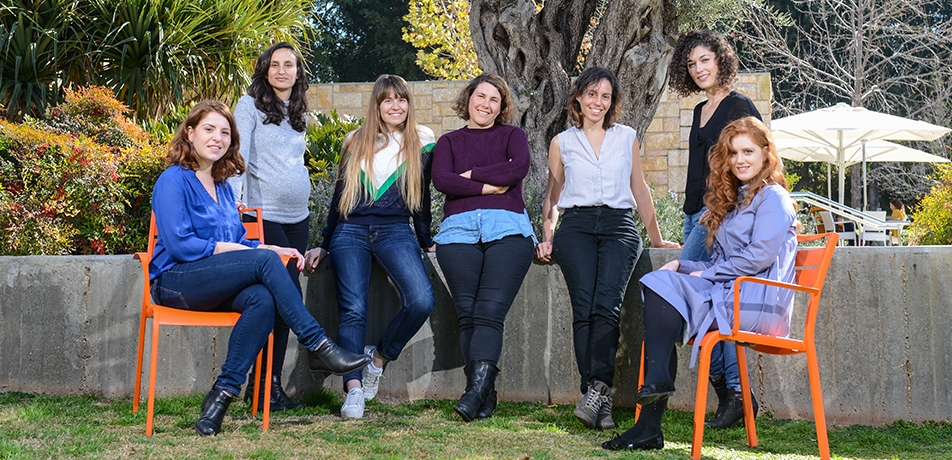
Seven special women in science: L-R: Yael Gropper, Eden Yifrach, Michal Shavit, Gil Schwarts, Gil Goffer, Adi Millman, and Rosalie Lipsh
In an effort to advance the careers of outstanding female scientists in Israel, the Edmond de Rothschild Foundation launched the Ariane de Rothschild Women’s Doctoral Program—which includes a scholarship and a series of other benefits—a decade ago. The foundation brought the program to the Weizmann Institute two years ago, and it is already bearing fruit. To date, seven Weizmann doctoral students from diverse backgrounds have been selected.
In a one-of-its-kind initiative, the Ariane de Rothschild Program selects outstanding female doctoral students from a pool of candidates nominated by deans at Israel’s five institutions of higher education; a steering committee chooses four recipients per institution. The women receive full tuition, a living stipend, and enrichment programming that brings together the recipients from all institutions—for networking sessions, professional development workshops, and inspiring lectures—providing a comfortable and supportive setting to discuss challenges women face in pursuing a career in science while managing motherhood and other concerns. The women also receive a grant to present their research at international conferences.
Selection is based on academic excellence, as well as a series of other factors—such as identifying candidates in scientific fields in which women are traditionally underrepresented, proven leadership experience, and engagement in the community and Israeli society. Special emphasis is placed on selecting women who come from diverse backgrounds, among them ultra-Orthodox women, new immigrants, Arab women and women from other ethnic groups, women from Israel’s geographical periphery, and young mothers.
Recipients are expected to give back to the community and volunteer in educational activities during their graduate studies.
“The Ariane de Rothschild Women’s Doctoral Program is a flagship project of the Edmond de Rothschild Foundation,” says Ms. Vardit Gilor, who manages the program at the Foundation. “These brilliant women are the new pioneers of the 21st century. They are passionate about advancing new discoveries in the sciences and supporting underprivileged communities through their volunteer work. It is the only program in Israel named for Baroness Ariane de Rothschild, and it is a key component of her vision to support and strengthen women around the world. Our aim is to create a support system for a cadre of women who, in the future, will successfully take on meaningful positions in academia and Israeli society.”
Below is a snapshot of some of the recent awardees from the Weizmann Institute.
***
Yael Gropper grew up in Dimona, which, she says, “was the best place to absorb and appreciate the diversity of Israeli society.” She was in the Israeli scouts throughout her youth, eventually serving in leadership positions. After high school, she did a year of community service before enrolling in the IDF, and was a flight control course commander in the Israel Air Force.
She became a Hebrew teacher, and during her undergraduate studies at Ben-Gurion University, she took part in the Rothschild Foundation Ambassadors Program, where she did volunteer work and founded a local café, together with neighborhood residents.
“Although I have always been very involved in community activities and teaching, it was very clear to me since I was a teenager that I wanted to become a scientist. I fell in love with science in elementary school, when my teacher explained the basic principles of physics,” Yael says.
She is conducting her doctoral research in the lab of Prof. Jakub Abramson in the Department of Immunology. Her goal is to elucidate how autoimmune disorders develop, and how this phenomenon can be exploited for cancer immunotherapy.
Specifically, she is trying to isolate “auto-antibodies” from patients with autoimmune diseases. These antibodies can recognize proteins that are presented on melanoma cells; Yael aims to develop new treatments for melanoma using antibodies that were already “designed” by nature.
***
Few students have arrived at the Weizmann Institute by the route Rosalie Lipsh took. Rosalie grew up in an ultra-orthodox community in Kfar Chabad. “Although science and technology studies are not common in our community, I chose to pursue an interesting and meaningful career,” she says. She received her bachelor’s degree from Machon Lev, a religious college, and enrolled in the Weizmann Institute for graduate studies. She is in the direct-PhD track in the lab of Dr. Sarel Fleishman in the Department of Biomolecular Sciences, where she is developing new methods for protein design.
Among her recent achievements were the development of methods for designing efficient enzymes to break down plant waste products into sugars and enzymes that could be used for treating poisoning by nerve agents, such as Russian VX and Sarin. She is now applying machine-learning and other methods to design efficient and selective proteins.
“There are few ultra-orthodox women at the Weizmann Institute and my first steps here were difficult for that reason,” she says. “But I have learned lessons that I hope could be useful and I am trying to help other young women in my community make their first steps into the world of science with a little less uncertainty than I had coming in.”
***
Chess and bacteria have one thing in common—they are in a constant state of defense and offense, and the study of bacteria and the game of chess are intellectual pursuits that keep Adi Millman on her toes all the time. Millman completed her MSc in the lab of Prof. Rotem Sorek in the Department of Molecular Genetics, and continued on to a PhD in that lab, studying the immune system of bacteria. She lives on nearby Kibbutz Na’an and volunteers at a girls’ school in Lod, where she teaches chess through an organization called Children playing Chess.
“Through chess, I try to develop their analytical thinking and help them acquire discipline and pursue excellence,” says Adi, who has one child of her own.
Bacteria and the bacteriophages that infect them impose great evolutionary pressure on each other. In order to survive, bacteria must constantly develop new anti-phage defenses, while phages must continuously overcome these bacterial defenses. So they are in a constant arms race. There are a number of known anti-phage defense systems, but recent evidence suggests many new anti-phage defense systems remain to be discovered in microbial genomes.
As part of her PhD research, Adi is developing algorithms aimed at discovering new anti-phage defense systems. She is now identifying a new set of phage-resistance systems, bringing into focus the complete “immune system” of bacteria, and understanding the factors that influence the ongoing phage-bacteria conflict.
***
For Gil Goffer, it all started with the Olympics—the national Youth Math Olympics, that is. She was 13 years old when she “fell in love with the Weizmann Institute,” she says, when she came to compete in this highly prestigious annual competition. Gil grew up in Haifa and practiced Thai boxing. After high school, she spent a year as a volunteer for the Society for the Protection of Nature in Israel. She joined the prestigious 8200 Unit of the IDF intelligence. She then embarked on a volunteer program in Cambodia before starting her undergraduate degree in math at Ben-Gurion University.
In her research in the lab of Prof. Tsachik Gelander in the Department of Mathematics, Gil is studying the symmetries of objects, which, she says, is like “observing the world’s beauty.” She volunteers in a Davidson Institute program called First in Science, which engages girls in STEM studies, and another program called Nobel Laureates for Excellence in Education, which encourages scientific curiosity among high schoolers. She is also a member of the women’s forum in her department.
***
“Mathematics and education were always my two great passions,” says Gil Schwarts, who is studying with Prof. Abraham Arcavi and Dr. Ronnie Karsenty in the mathematics education group in the Department of Science Teaching. Gil grew up on Kibbutz Ein-Hahoresh, near Netanya, and is the first member of her family to pursue an academic degree. After completing her BSc in mathematics at Ben-Gurion University, she found what she calls “the perfect place for me”—the department in which she is now studying, which allows her to combine her mathematical knowledge and experience in education to lead research that aims to impact mathematics learning in Israel.
The focus of Gil’s research is on how a lead teacher in mathematics can become a successful facilitator who can foster learning among other mathematics educators. Her research is expected to make both a theoretical contribution—in capturing the evolution of the facilitators’ professional repertoire—and a practical impact, in understanding how to facilitate the scale-up of educational innovations.
Gil serves on the Ariane de Rothschild scholarship steering committee, and tutors a young woman from an underrepresented background studying computer science at Tel Aviv University, through the Rothschild Foundation’s “Academy for Life” program.
***
Michal Shavit was born in Tajikistan and made aliya with her family at the age of three. She grew up in Karney Shomron and took an early interest in math. When she was 13, she enrolled in Bar-Ilan University’s prestigious math program for youth, and even took several university-level courses. At 18, she joined the Israel Air Force and served as an officer for five years, and she continues to plan and control air operations in reserve duty.
She went on to receive a bachelor’s degree in math from the Technion, where she also studied architecture and was enrolled in the university’s excellence program, also funded by the Rothschild Foundation.
“That program shaped my character and way of thinking as a researcher and I am grateful for that,” Michal says. She volunteered in a nonprofit organization called Aluma, helping high school girls who made aliya from Russia as they prepare to join the Israel Defense Forces.
She received her MSc in particle physics at the Weizmann Institute, and is currently doing a PhD in hydrodynamics—the study of the motion of fluids—in theoretical physics, under the guidance of Prof. Gregory Falkovich in the Department of Physics of Complex Systems.
***
A student in the lab of Prof. Maya Schuldiner in the Department of Molecular Genetics, Eden Yifrach studies a special compartment of the cell called the peroxisome, in which several key metabolic pathways reside, including the breakdown of fats and decomposition of harmful hydrogen peroxide. She has characterized nearly 40 new peroxisomal proteins, significantly expanding the current protein count of peroxisomes.
“I hope this work will fill gaps in the knowledge of the intricate network of metabolic pathways in peroxisomes, and will serve as a basis for diagnosis and treatment of patients suffering from devastating metabolic peroxisomal diseases,” she says.
Eden grew up in a small community, Massad, in the lower Galilee. She attended the Kadoorie Agricultural High School, where she experienced environmental research for the first time.
“It was love at first sight—I felt challenged and excited to succeed,” she recalls.
As a high schooler, she won a prize from the Ministry of Environmental Protection and the Ministry of Education for outstanding research. “I remember thinking that being a researcher is a dream job: you are paid to think, and to help others. Amazing!” She served in the IDF as a tour guide at the Sde Boker Field School, where she helped high school students conduct desert ecology research.
Eden went on to receive her BSc from the Hebrew University’s Faculty of Agriculture, and did her MSc at the Weizmann Institute. Last year, she worked with the Davidson Institute in the Active Science program, in collaboration with a government initiative that promotes education for school drop-outs; the program promotes self-esteem through learning science. Eden is also on the steering committee of the Ariane de Rothschild scholarship program, which organizes meetings and enrichment activities. She is also mother to a young child, with another on the way.
“One powerful motivation for my study of metabolic diseases comes from personal experience,” she reveals. “My sister was diagnosed with a rare metabolic disease at age 14. She battled to live as normal a life as possible, although she became blind and physically disabled. She died five years ago at age 28. Her positive legacy is an inspiration for me to conduct research and solve biological mysteries that may one day help others.”
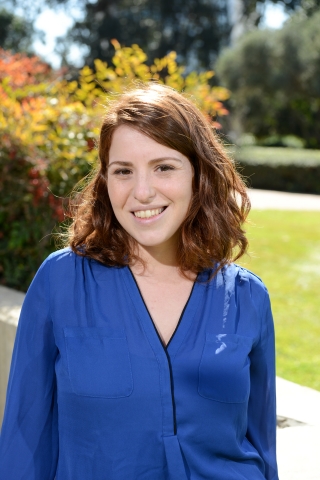
Yael Gropper
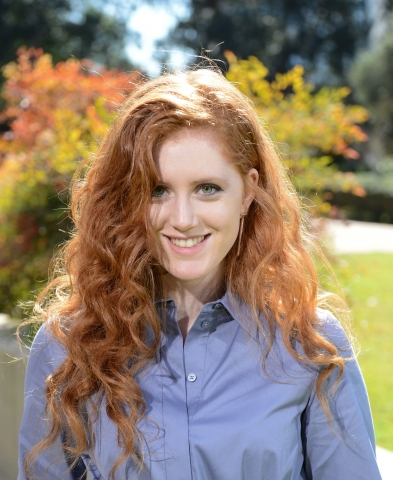
Rosalie Lipsh
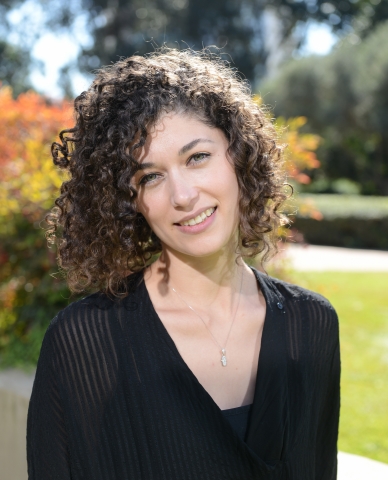
Adi Millman
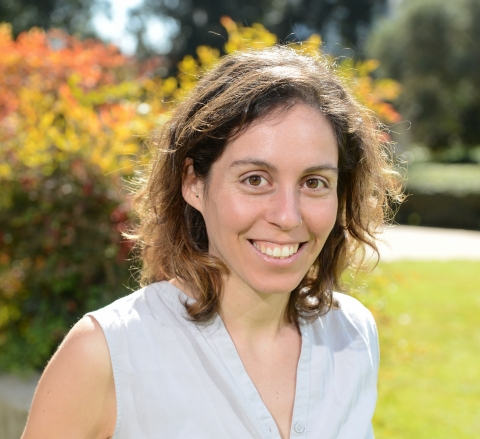
Gil Goffer
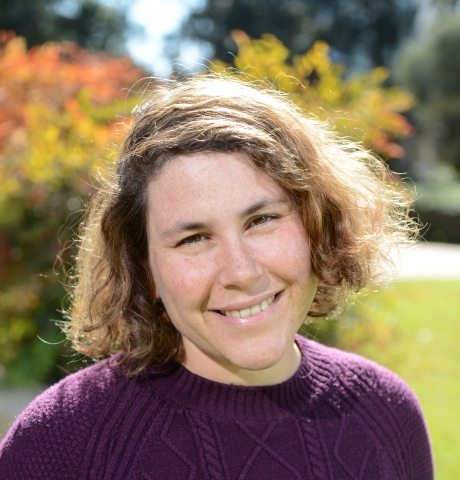
Gil Schwarts

Michal Shavit
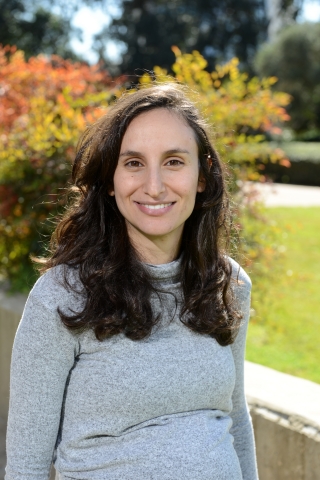
Eden Yifrach



